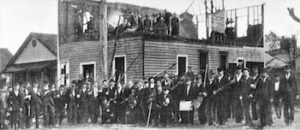
On this date in 1898, the Wilmington race riot took place, which became a landmark in North Carolina history.
Over a century later, some details are still in question. The number of victims, for example, is disputed, with the total running from the coroner's 14 to unconfirmed reports of scores or even hundreds of deaths. All of the reported victims were black. Reports circulated amid the violence of the shooting of a white man, Will Mayo. His fate remains a mystery. More certain is that the event marked the climax of the white supremacy campaign of 1898 and a turning point in the state's history.
Restrictions on Black voting followed, marking the onset of the Jim Crow era of segregation. Though termed a "race riot," it has also been called a massacre, rebellion, revolt, race war, and coup d'etat. The unusual situation of the Wilmington events, involving the removal of the legally elected mayor and city council and installation of revolt leader Alfred Moore Waddell, make this last term technically correct. In the days preceding the election of 1898, Waddell, a former Confederate officer and U.S. Congressman, called for the removal of the Republicans and Populists then in power in Wilmington and proposed in a speech at Thalian Hall that the white citizens, if necessary, "choke the Cape Fear with carcasses."
What had particularly incensed Waddell and others was the publication in August of an editorial in the Wilmington Daily Record, a local Black-owned newspaper. Alex Manly, the editor, charged that "poor white men are careless in the matter of protecting their women" and that "our experience among poor white people in the country teaches us that women of that race are not any more particular in the matter of clandestine meetings with colored men than the white men with the colored women." The sexually charged editorial, reprinted across the state, provided Democrats with an issue to inflame racial tensions as election day approached.
Although that day passed without notable incident, two days later, on November 10, at 8 a.m., about 500 white men assembled at the armory of the Wilmington Light Infantry. After several others declined the role, Waddell led them to the Daily Record office in Free Love Hall four blocks south on Seventh Street between Nun and Church Streets. The crowd swelled to nearly 2,000 as they moved across town. In the meantime, Manly had fled the city, as had numerous other blacks, in expectation of violence.
The mob broke into the building, a fire broke out, and the top floor of the building was consumed. The crowd posed for a photograph in front of the burned-out frame.